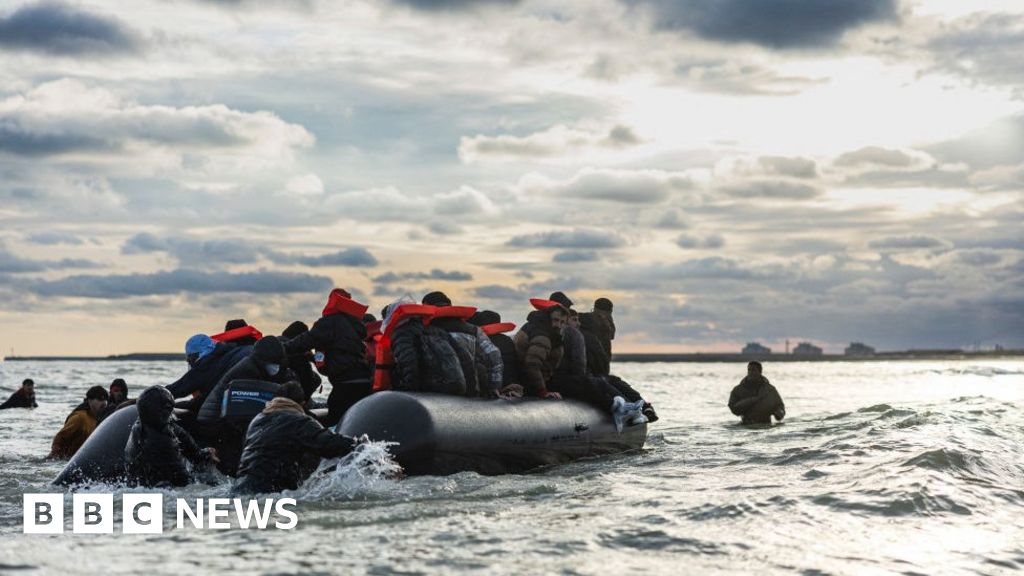- Written by Sam Francis
- BBC News political reporter
image source, Getty Images
Downing Street said the UK government would not bring back asylum seekers who had traveled to Ireland until EU-wide asylum rules were changed.
Last week, the Irish government announced emergency legislation to bring back the growing number of asylum seekers from Northern Ireland.
But the prime minister's official spokesman said: “It's up to the UK to decide who it accepts and who it doesn't.”
Irish and British ministers met on Monday to discuss the refugee system.
The prime minister's official spokesperson said: “It is clear that we are not going to start accepting returns from the EU, just as the EU will not accept asylum returns from the UK to France.”
“Even if Ireland passes the bill, it will be up to the UK government to decide what Ireland will and will not accept.
The Irish government said there was an influx of asylum seekers from Northern Ireland because they were “fearful” of being sent to Rwanda.
And he says he will not allow Ireland to provide a “loophole” to someone else's “immigration issue”.
Ireland's Deputy Leader Michael Martin denied a dispute was developing, but a planned meeting between Home Secretary James Cleverley and Irish Justice Minister Helen McEntee was abruptly postponed late on Sunday night. .
But a pre-scheduled meeting between Mr Martin and Northern Ireland Secretary Chris Heaton-Harris on Monday focused on the asylum system.
A meeting of the Intergovernmental Conference established under the Good Friday Agreement and held regularly ever since.
“Absolutely not,” Heaton-Harris said after the meeting. [do] We want to turn our relationship with Ireland upside down,” he said of his asylum claim.
But he added that since Brexit, the UK has been told to “deal with the EU as a whole” and that is the government's current approach.
The UK government remained committed to “protecting” the Common Travel Area (CTA) agreement, which allows free movement between Britain and Ireland, from “abuse” by asylum seekers.
Mr Martin said the emergency legislation did not seek to change the current arrangement with the UK.
Instead, it is to “legislate” a decision taken by the High Court of Ireland, which has decided that Ireland will designate the UK as a “safe third country” and seek asylum at the risk of being sent to Rwanda. The court ruled that the applicant could not be deported.
Ireland said 80% of recent asylum seekers came from Northern Ireland, but did not say how this number was determined.
Mr McEntee said that so far this year, the significant majority of people seeking asylum in Ireland had applied at international protection offices rather than at ports or airports, and that this was due to people crossing the border by land from the UK. He said that he was pointing out that these people were
BBC Verify was unable to find published figures for the 6,000 migrants it says entered Ireland in this way and contacted the Irish government.
Although he did not provide numbers, he said, “Our solid assessment, based on the experience of our staff and others working in the field, as well as material gathered in interviews, is that in most cases first-time IPO applicants have already gone public. “There is,” he said. land border.”
Prime Minister Rishi Sunak has claimed that the increased flow of people to Ireland shows that Rwanda's asylum policy, which became law last week, is already acting as a deterrent.
On Sunday, Taoiseach Simon Harris said: “We will not allow other people's immigration policies to affect the integrity of our immigration policy.”
He said he had asked Mr McEntee to introduce legislation to cabinet on Tuesday that would allow asylum seekers to be returned to the UK.
However, there is no concrete agreement allowing Britain to return asylum seekers who cross the Channel to France.
Rwanda's deterrence
Ireland's proposed legislation follows an Irish High Court ruling that declared the UK a “safe third country” and that asylum seekers could not be returned to Ireland due to the risk of being sent to Rwanda. It is.
Nick Henderson, chief executive of the Refugee Council of Ireland, said he believes there may be a link between the UK policy change and the rise in asylum seekers in Ireland over the past two years. Ta.
In an interview with BBC Radio 4's Today programme, Mr Henderson said it was “unclear” whether the new law was “sufficient to avoid the problems the judge identified”.
Many people who have entered the UK illegally in recent years have come by boat from France.
And Home Office figures show more than 7,000 migrants have made the journey and arrived in the UK so far this year, a record high for the first four months of the calendar year.
Under the Rwanda policy, anyone who enters the UK illegally will be deported to the East African country, where they will be given the option to apply for asylum.
The plan was approved by parliament last week after months of political wrangling and legal challenges. The government said the first flights are expected to take off within 10 to 12 weeks.
The Home Office confirmed late Sunday that detention of migrants will begin in the coming weeks in preparation for the first flights to Rwanda.


